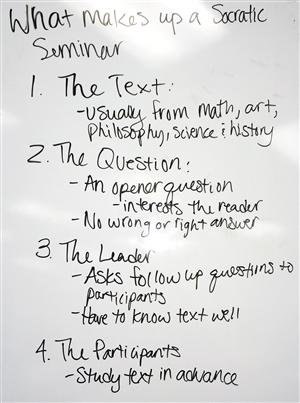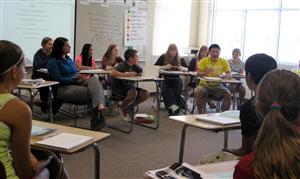Socratic Seminar is one of many effective teaching strategies AVID uses. Socrates believed that enabling students to think for themselves was more important than filling their heads with "right answers." In the Socratic Seminar, participants seek deeper understanding of complex ideas through rigorously thoughtful dialogue. A Socratic Seminar fosters active learning as participants explore and evaluate the ideas, issues and values in a particular text. The skills that students develop through participation in a Socratic Seminar are critical for college success.
Successful Socratic Seminars are dependent upon groups of students developing skills together over time. It is imperative that students understand several concepts before a Socratic Seminar. These include the:
- Difference between dialogue and debate
- Elements of Socratic Seminar
- Role and responsibilities of the participants
- Guidelines for seminar behavior
Students must also complete the pre-work required to prepare for the Socratic Seminar.
Inner Circle/Outer Circle Method
When there are more than 25 students in a class, the teacher can consider using the inner circle/outer circle method of Socratic Seminar. With this method, 15 to 20 students will take on the role of seminar participants and the rest of the students will act as observers. It is important that the observers are given specific tasks and must provide feedback during the debriefing process. The observer role is crucial to the group's development of their skills and should not be seen as a way to get out of participating but as serving a different purpose in the process.
Students are seated as follows: Desks are arranged in two circles, one outside the other. Seminar participants sit in the inner circle. Observers sit in the outer circle but are positioned so they can see and hear the student or students they are assigned to observe. Activity sheets are included in this unit for observers to use and make notes.
A "hot seat" maybe included in the inner circle. This is a chair that remains empty at the beginning of the seminar. If at some time during the seminar an observer in the outer circle feels a strong need to participate, that student may move to the hot seat, contribute to the dialogue and then move back to the outer circle. The "hot seat" is not essential to the process but can be used effectively to stimulate participation.
If a class is small enough, the teacher will probably have all students participate in the seminar. Having a few students function as observers can help immensely in the debriefing process as they are able to notice things that participants may not notice. It can also be helpful to have tutors or other teachers function as observers and give feedback after the seminar.
These are photos from a Socratic Seminar led by AVID-trained honors English teacher Amy Rosewall at Shakopee West Middle School. The students discussed their thoughts on several questions regarding the book the class was asked to read, which was titled "The Outsiders." The students completed the pre-work the day before then participated in the Socratic Seminar the following day.




